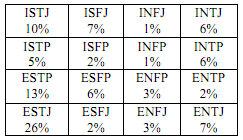That's a surprising result, since it doesn't match that well with what studies have found previously. Of course, a more meaningful comparison would against the average type for the population (so that selection effects would be visible). Also, the culture for programming would make a big difference.
According to
wikipedia only about 2% of the population of Cuba has access to the internet... and that 2% is composed mostly of government officials. Computer ownership is Cuba is also extremely low. Given all this, I think it makes generalizing about computer programming in Cuba vs. the rest of the world very problematic.
For example
this study found the most over-represented types to be:
- INTJ 3.40x
- INTP 2.46x
- ENTJ 2.23x
- ISTJ 2.08x
This fits my own experience as a computer programmer. There are, of course, STs of other types as well. Even in the above study, ESTJs were the second most numerous type, even though they their preference factor was 1.73 (much lower than any of the NTs).
There's also
this paper, which proposes a relationship between preferences and different kinds of software engineering jobs. For preferences they relate:
- Systems Analysis to E & F (where communication with clients or disparate
groups is key)
- Software Design to N & T (where abstraction and logical analysis are key)
- Programing/Implementation to I, S & T
- Testing to S & J
- Maintenance to S & P
That makes some sense to me.



